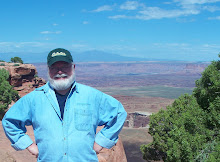
"The Sentinel, having made his way down the side of the hill, rounded the corner and entered my room, my cave.
“Warm yourself, my brother,” I invited. He came over to my fire in the center of the room, took off his snow covered robe of skins, his hood and dropped his bow. Underneath his robe, the Sentinel had hides covering his legs and a deerskin vest, with rabbit fur around his wrists and ankles above his moccasins. He turned his backside to the fire.
“The wind,” he said, “is getting stronger. I was going to go into my hut to avoid the wind, but I thought I would check on you. It is warmer here than in my drafty hut.”
Over the years, the Sentinels and I had come to know one another. As in village life, some were friendlier than others, but each of them had loosened their grip on my “situation.” I always maintained a respect for them and never took for granted any leniency, nor did I take liberties without some sort of understanding from them.
In return, I shared whatever small measure of comfort or pleasure that I had that they did not – such as my warm cave on a cold, windy day or night. I had also made drawings of them while on watch, or sitting by their fire, or just a drawing of their face which they took home for their families.
I offered the Sentinel some sassafras root to chew.For my part, the Sentinels were an unexpected break in the solitude of my daily life. Most of the time, they were on the rocky top of my cave, watching the valley for any intruders. During warm weather, I might not see them for several days. But I knew they were there; I could smell their fires or hear their calls to other Sentinels on other hilltops. Their presence was comforting and helped relieve the loneliness of my life.
“I see new hands on your wall, yes?” the Sentinel asked.
”Yes,” I replied.
“How do you do that?” he asked.
I needed to be careful in my answer, as the hand was the handprint of my Son, Third Heron, and I did not want to admit that he had been here in my cave.
“By experimenting, I found a white soft rock which I could mash and grind into a fine powder. Next, I would mix it with water, take it in my mouth—but not swallowing—then blow it over the hand on the wall, producing the white outline of a hand,” I explained.
He moved closer to the seven hands on the wall which ranged from small to a medium-sized man’s hand, the seventh; the Sentinel was examining them carefully, moving left to right, small to large. I did not start doing the hands until Third Heron was two seasons old; as he grows older, there is a noticeable difference in the sizes of his handprint on the cave's wall. I saw the differences; maybe the Sentinel would not. There could be trouble for me if he chose to make it.
The Sentinel turned to look at me. He raised his eyebrows… and then he smiled. “Very nice, and clever, very clever,” he said knowingly. “While I appreciate them, do not expect me to praise you or tell anyone about them. I am not that sort of man.” Again, the smile. He understood that they were not my hands, that someone had been in my cave which was against the rules, but he would not say anything. I put my hand on his shoulder and squeezed, to say “thank you.” We nodded to each other."
Without feelings of respect, what is there to distinguish men from beasts?
~~ Confucius, Chinese Philosopher, 551-479BC








No comments:
Post a Comment